
Aaron Eckhart plays SSgt. Michael Nantz
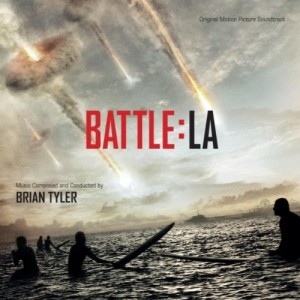
One way to determine just how predisposed one is to sci-fi is by comparing one’s opinion of Battle: Los Angeles with one’s opinion of Black Hawk Down. This opportunity is now available to theater-goers because the former movie was made by taking the old reels of the latter movie and digitally inserting aliens. This of course is not literally true (though it gives the good reader a very good idea of what to expect should he purchase tickets) so it’s not a perfect test. Black Hawk Down, as I recall, had some directorial flourishes and humorous moments that were absent from its sci-fi version, while the sci-fi version manages to pull more of a plot together amid all those bullets and explosions (indeed, I remember thinking, after Black Hawk Down, that the moviemakers had saved some money on production by bypassing the screenwriter at the cost of a missed opportunity to make a good movie). These variables aside, the two flicks are remarkably similar and one may take the test at theaters over the next handful of weeks.
For me, adding aliens to the plot, such as it is, went some way towards making the movie a more enjoyable experience. This should not be misconstrued as an endorsement for the movie with no reservations, merely a preference for one military action demo reel over another. As Shakespeare wrote, “If two men ride of a horse, one must ride behind.” If I am going to sit through about 100 minutes of violence and destruction by way of an armed forces recruitment video, there at least ought to be an alien invasion.
[continue reading…]
Help Promote Prometheus Unbound by Sharing this Post


Some years ago I bought the first book of Isaac Asimov’s Foundation series, made it to approximately page 40 and tossed it aside. The writing was unimpressive, but not so bad that I would have normally opted to leave it unfinished. The problem for me was that I was not willing to suspend my disbelief so as to accept the author’s premises. I did not see the point in exploring something so patently untrue, and if his prose was going to be that insipid, with nothing especially arresting about the early part of the plot, then the opportunity cost was too high. I felt much the same as I watched The Adjustment Bureau, though I did sit through until the end.
In this film’s particular world, the human race has been guided through the centuries, off and on, by an entity referred to as The Chairman who has in his employ a number of beings, human in appearance, with extraordinary powers. The Chairman took the human race from barbaric tribalism to the height of the Roman Empire before deciding to allow us to make our decisions for ourselves. What followed were the Dark Ages, so this benevolent dictator assumed control once more and guided us through the Renaissance and the Enlightenment up to about 1910, whereupon we were given one more chance to be free. We produced WWI, The Great Depression, WWII and brought the world to the brink of nuclear holocaust, so we lost our freedom yet again, presumably for good this time.
[continue reading…]
Help Promote Prometheus Unbound by Sharing this Post
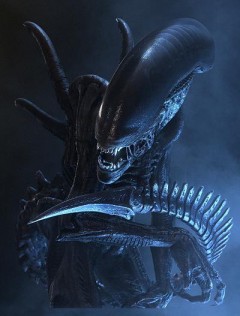
This time, it’s war.
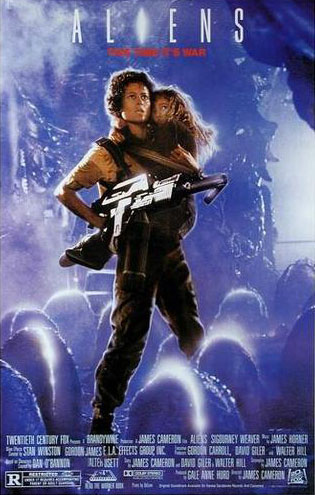
It is possible, however unlikely, that I could shuffle a deck of cards, lay them face down on a table and, in dealing to you the top five, deliver a royal flush. If I dealt to 649,740 people, the odds are good that at least one of them would get poker’s strongest hand, but to the one who actually got it, it would seem almost miraculous, more than he deserved. The cinematic equivalent of a royal flush is what the Alien trilogy received as first a young Ridley Scott, then a young James Cameron, and finally a young David Fincher were chosen to direct its films (some are occasionally moved to insist that there were four Alien movies. I must ask the good reader to accept my assurance that there was no fourth film; any lingering memories of such a thing are probably due to a bad dream).
By all rights, Aliens should have been unremarkable. Following a classic with a classic is next to impossible. Francis Ford Coppola did it, but he followed his own work and brought his same style and vision back to the tale. Aliens would be directed by a Canadian — a near-American! — who was going off a British film that had revolutionized a genre. Although the first installment left unanswered questions, it was not fashioned in such a way that a sequel naturally sprang from its story. For more on what such a situation is likely to produce, the reader may watch the sequels to Psycho and Jaws. If he wishes to explore the top end of the Bell Curve of this particular demographic, he should check out 2010 (The Empire Strikes Back might conceivably be added, but Lucas was still intimately involved with that project and, at any rate, in this reviewer’s humble yet obdurate opinion, Episode V is decidedly inferior to Episode IV).
[continue reading…]
Help Promote Prometheus Unbound by Sharing this Post
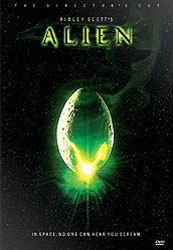
 Could I overpraise the sci-fi horror sensation Alien if I wanted to? I look through my thesaurus and see words like magnificent, brilliant, exalted, superior, remarkable, exceptional and outstanding and conclude that the English language’s strongest adjectives do no more than justice to the film. Necessity being the mother of invention, and there being no cinematic achievement whose fitting accolades would be too much for Alien, one must suppose the word that hangs too weighty an ornament on that particular tree has yet to be invented.
Could I overpraise the sci-fi horror sensation Alien if I wanted to? I look through my thesaurus and see words like magnificent, brilliant, exalted, superior, remarkable, exceptional and outstanding and conclude that the English language’s strongest adjectives do no more than justice to the film. Necessity being the mother of invention, and there being no cinematic achievement whose fitting accolades would be too much for Alien, one must suppose the word that hangs too weighty an ornament on that particular tree has yet to be invented.
It has been over thirty years since it came to the silver screen. Had the studio done to it what was done to so many Orson Welles films and boxed it away in a vault, it could pull it out today and, without touching a single frame, release it to theaters and nary a soul would suspect a thing. Understand, I do not mean merely to say that it would play well to modern audiences. Though indisputably true, there are many older films that can do just that. I have sat in on a showing of Alfred Hitchcock’s Rear Window as it positively thrilled an audience half a century after its initial release. No, I mean that few would even pause to consider that the film seemed out of its era.
[continue reading…]
Help Promote Prometheus Unbound by Sharing this Post
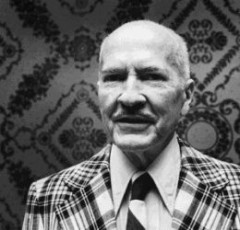
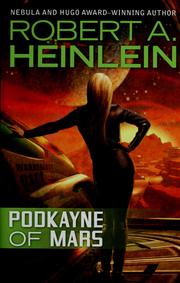 When Robert Heinlein told a tale, it was with a compelling and engrossing voice. He created personalities with interest and depth and fashioned dramatic interactions to keep us involved. However much or little happens to his characters, the experience for us readers is enhanced because we become invested in the people who inhabit his stories. Even a book like Podkayne of Mars, which one might quibble is a touch underplotted, is a satisfying read because of the investment in the people.
When Robert Heinlein told a tale, it was with a compelling and engrossing voice. He created personalities with interest and depth and fashioned dramatic interactions to keep us involved. However much or little happens to his characters, the experience for us readers is enhanced because we become invested in the people who inhabit his stories. Even a book like Podkayne of Mars, which one might quibble is a touch underplotted, is a satisfying read because of the investment in the people.
Podkayne Fries, a girl on the verge of womanhood with dreams of becoming an interplanetary ship captain, is the principle narrator and protagonist of the story. She and her younger brother Clark get an opportunity to accompany their uncle on a voyage to Venus and Earth. Her uncle, however, is an ambassador and there are those who would interfere with his mission, disdaining no despicable act in their attempts. That is about all there is to the story structure. There are a few plot points thrown in – such as the mysterious object Clark smuggles on board, or the solar storm that catches them between planets – and the ending is harrowing, but it becomes clear early on that the novel’s strongest points lie elsewhere.
[continue reading…]
Help Promote Prometheus Unbound by Sharing this Post
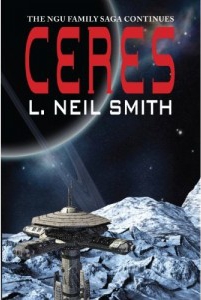

Ceres, a finalist for the 2011 Prometheus Award for best libertarian novel, is the latest opus from noted libertarian author L. Neil Smith, best known for The Probability Broach. As you would expect from Mr. Smith, Ceres is a treasure trove for the liberty lover, a work that could only come from an uncompromising libertarian. Nearly every page has some sound libertarian principle or perhaps a new twist on libertarian ideas that the reader may not have considered before. For instance, we know that government is coercion, an institution organized around this principle, but have we considered the role of agriculture in the development of the State? Was it perhaps our settling down into permanent communities that allowed for the contraction of that particular disease? Right or wrong, it’s food for thought and worth considering. Ceres is filled with such things.
The story takes place in the 22nd century and follows the lives of characters connected in some way to the terraforming of Ceres, the planetoid – now called a dwarf planet — and largest object in the main asteroid belt. Most of the protagonists belong to the Ngu family, and those that don’t are close friends. Llyra Ayn Ngu is a figure skater born on Pallas, an object in the asteroid belt even smaller than Ceres. She goes to Ceres to acclimate her body to its greater gravity, and from there moves to the Moon, and thence to Mars and finally to Earth, where she dreams of ice skating success.
The different sections of the book are named after the gravity of each body, whether it’s one tenth gee, one sixth, one third or one gee. Given this, we might call Llyra the main character, although her brother Wilson gets just as much attention. Nevertheless, Llyra’s goal and struggle to achieve it are the only constants in the novel, present from the opening chapter to the end. The rest concerns the various interests of the Ngu family and friends, often when in conflict with the environmentalists who seek to stop human expansion into space and the sullying of the environment as they see it.
It is beyond dispute that L. Neil Smith is a dedicated libertarian. He has spent many hours of his life pouring himself into prose, seeking to spread the libertarian ethic and philosophy for the betterment of mankind. However, just as, in a debate, a libertarian stands a better chance of convincing if the other party genuinely likes him, so too does a book stand a better chance of convincing in proportion to how much it charms the reader. One might make a few suggestions in the interest of getting the most out of Ceres.
[continue reading…]
Help Promote Prometheus Unbound by Sharing this Post
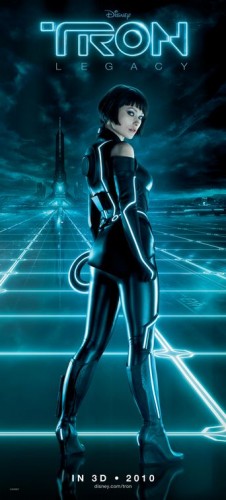
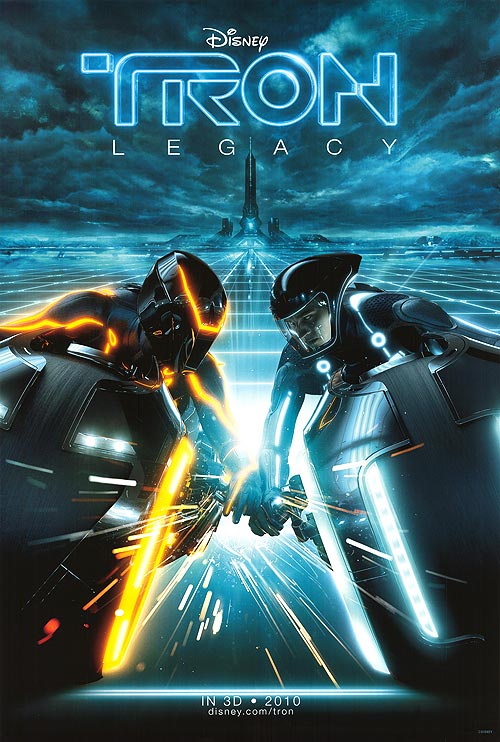 It’s not often a science fiction storyteller creates a new world for his story. Most tales in the genre, like Neuromancer or 2001, are set in our world a few years or decades in the future. Some, like Terminator II, don’t even bother moving the clock ahead. Movies like Star Wars and Avatar are relatively uncommon (while others like The Matrix are difficult to categorize). Tron: Legacy is one of those infrequent works set almost entirely in a fictional world.
It’s not often a science fiction storyteller creates a new world for his story. Most tales in the genre, like Neuromancer or 2001, are set in our world a few years or decades in the future. Some, like Terminator II, don’t even bother moving the clock ahead. Movies like Star Wars and Avatar are relatively uncommon (while others like The Matrix are difficult to categorize). Tron: Legacy is one of those infrequent works set almost entirely in a fictional world.
Kevin Flynn (Jeff Bridges), founder of a tech company and world-recognized innovator, disappeared in 1989, apparently on the verge of some life-altering discovery. Two decades later, Kevin’s assistant tells his son Sam (Garrett Hedlund) he has received a page – as in pager, not book – from his late father. When Sam investigates, he is sucked into a digital world, presumably the one his father disappeared to, and finds himself in a fight for his life.
[continue reading…]
Help Promote Prometheus Unbound by Sharing this Post




















